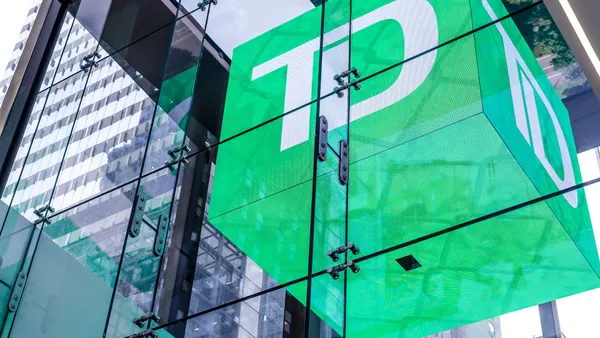Dive Brief:
-
Robo-adviser Betterment is opening its FDIC-insured checking and savings accounts to the public after first offering it to a group of wait-listed customers in October.
-
The New York-based fintech is partnering with Kansas City, Mo.-based NBKC Bank to provide the checking accounts. The company is working with more than a dozen banks on the broker-deposit cash account "to bring the best rates we can find to our customers," Betterment founder and CEO Jon Stein told TechCrunch.
- Betterment first announced plans for the products last summer, immediately attracting scrutiny from the Financial Industry Regulatory Authority (FINRA) and the Securities and Exchange Commission (SEC), which asked for more clarity regarding the banklike products.
Dive Insight:
Betterment says the new products come with no overdraft or other checking fees and no minimum balance requirements. The checking accounts are insured up to $250,000, and an individual savings account is insured up to $1 million.
"Cash Reserve is different from a savings account in that it offers unlimited transfers and FDIC insurance up to $1M with our program banks," a Betterment spokesman told Banking Dive.
The fintech plans to offer mobile check deposit and joint checking accounts in the future.
"It's important for Betterment’s business model and further expansion to have consumer assets in one place," Bryce VanDiver, a partner at consultancy firm Capco, told Banking Dive. "Doing so provides both the ability to place funds in a sweep account or in a deposit account.
"In a volatile market, consumers want choice," VanDiver added. "Deposit and savings accounts enable customers to sit peacefully on the sidelines, whereas sweep accounts give the ability to buy on dips."
Like other wealth management startups, Betterment has seen signups grow amid the coronavirus pandemic. Even in the worst weeks of March, the company has seen net new customers, Stein told TechCrunch.
"And more people were depositing," he said. "Twenty-five percent more people were depositing than withdrawing. Just among millennials, that number was 36%."
VanDiver said he expects that trend will continue until the market stabilizes.
"Betterment has lots of new customers right now off the back of the boom in retail investing, so timing-wise, the launch could make sense: Get as many services into the hands of customers as possible and ensure their loyalty," Sarah Kocianski, head of Research at fintech consultancy 11:FS, told Banking Dive.
The additional consumer products will also provide greater insight into cash flow, spend analysis and overall financial health monitoring, VanDiver said.
"The bet here is that there will be continued growth in consumer bank advising, via robo or financial health tools, as a value-add against the traditional bank model, where this is not included," he said.
Betterment joins other fintechs, such as Robinhood and Wealthfront, which have launched banklike products over the past year.
Robinhood launched its cash management account last October, and is partnering with Goldman Sachs, HSBC, Wells Fargo, Citibank, Bank of Baroda and U.S. Bank.
Wealthfront launched a cash account in February 2019. The fintech is partnering with multiple banks, including East West Bank and New York Community Bank, according to CNBC.
"This is a super crowded market, so what it offers will have to be better than anything customers are currently using or can get elsewhere," Kocianski said. "The appetite for 'ease' and having everything in one place is still much less than it is for finding new ways to save or make money."













